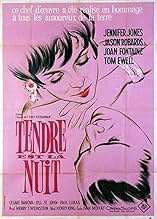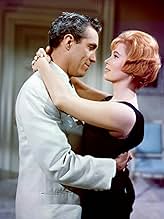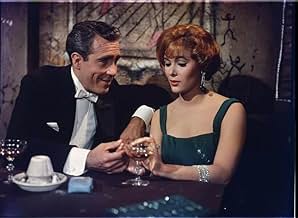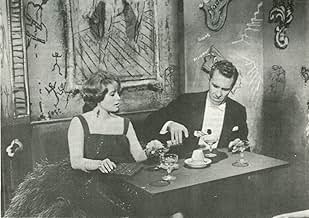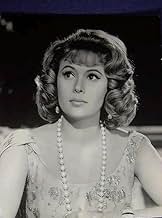CALIFICACIÓN DE IMDb
6.0/10
948
TU CALIFICACIÓN
- Nominado a 1 premio Óscar
- 1 premio ganado y 1 nominación en total
Jason Robards
- Dr. Richard 'Dick' Diver
- (as Jason Robards Jr.)
- Dirección
- Guionistas
- Todo el elenco y el equipo
- Producción, taquilla y más en IMDbPro
Opiniones destacadas
This movie was a flop at the time and has been pretty much forgotten, which is a shame. It's a faithful adaptation of F.Scott Fitzgerald's moving story which is a touch lifeless, but still worthwhile.
The plot is ofcourse very good, a love story which is intriguing and very sad. There is perhaps not quite enough emotion throughout most of the film, but by the time the end comes the film has become pretty moving. Jason Robards was definately miscast as Dick Dyver [a good name for a porn star!]but Jennifer Jones shows what a good actress she sometimes could be ,especially when she is displaying her character's 'madness' ,if that's not too strong a word. None of the supporting characters are as interesting as they should be except Jill St John's aspiring actress and there is somehow little feel for the period, but the strength of the story just about carries one through. Mention should be made of Bernard Herrmann's often touching [if a bit self derivative!]music, but having the film's theme song [which he did not write] played endlessly on the piano by one character gets a bit annoying.
Despite it's flaws ,this is a fairly solid romantic drama that probably seemed old fashioned even in 1962, but deserves some reappraisal.
The plot is ofcourse very good, a love story which is intriguing and very sad. There is perhaps not quite enough emotion throughout most of the film, but by the time the end comes the film has become pretty moving. Jason Robards was definately miscast as Dick Dyver [a good name for a porn star!]but Jennifer Jones shows what a good actress she sometimes could be ,especially when she is displaying her character's 'madness' ,if that's not too strong a word. None of the supporting characters are as interesting as they should be except Jill St John's aspiring actress and there is somehow little feel for the period, but the strength of the story just about carries one through. Mention should be made of Bernard Herrmann's often touching [if a bit self derivative!]music, but having the film's theme song [which he did not write] played endlessly on the piano by one character gets a bit annoying.
Despite it's flaws ,this is a fairly solid romantic drama that probably seemed old fashioned even in 1962, but deserves some reappraisal.
Well, c'est la vie.
A wonderful cast and beautiful scenery are the highlights of "Tender is the Night," a 1962 film starring Jason Robards, Jennifer Jones, Tom Ewell, Joan Fonaine, Jill St. John, and Paul Lukas. The film is based on a book by F. Scott Fitzgerald.
Fitzgerald wrote beautiful prose, but much of his work has been difficult to adapt to the screen. He himself worked as a writer in Hollywood but wound up uncredited on most of the scripts and told someone that he did recognize one of his lines in a film that evidently had not been cut from a script.
In this film, Robards plays Dick Driver, a psychiatrist who falls for one of his patients, Nicole (Jones). Nicole is being treated for mental instability, the result of incest (though this is only hinted at). When Dick realizes his feelings, and hers, he quickly distances himself, but she runs into him after she leaves the sanitarium and the two wind up getting married.
Nicole is filthy rich, and the money is controlled by her sister (Joan Fontaine). Dick gets lulled into the good life, the parties, the travel, the luxury, and while he intends to return to his work at the sanitarium and finish a book, he doesn't go. This is mainly because the insecure and sometimes paranoid Nicole is resistant. When he finally returns to the sanitarium, his mentor (Lukas) is dying and the sanitarium has been taken over by a colleague, who only wants Driver's investment. Driver refuses, since he would have to get the money from Nicole, but she insists. But for Driver, it feels like it's all too late.
The acting is superb and Jones, one of my favorites, looks gorgeous throughout. She is somewhat nervous and mannered as Nicole, but that's the character, and she captures her. Robards is strong, emotional, and excellent as the deeply convicted Driver. And how wonderful to see Paul Lukas. I actually recognized his voice and then looked at his face -- I'm so used to seeing him in movies made 20 years earlier that I didn't recognize him at first.
The problem with the film for me is that so much that goes on is beneath the surface -- this can be a fascinating feature, but it is directed at too leisurely a pace by Henry King. The St. John character is never really fleshed out, she darts in and out of the picture; ditto the drunken composer played by Tom Ewell. We just don't know enough about him to care. Joan Fontaine wears some great clothes and acts well, and we do get to know her somewhat.
The other problem is the time in which it is set, which seems a bit generic. It's supposed to be the '20s - I can tell by the music - but not by anything else. The ambiance is '60s.
Nevertheless, Tender is the Night was an ambitious project that probably could have used some judicious editing, but if you're a Jones fan you won't want to miss it.
A wonderful cast and beautiful scenery are the highlights of "Tender is the Night," a 1962 film starring Jason Robards, Jennifer Jones, Tom Ewell, Joan Fonaine, Jill St. John, and Paul Lukas. The film is based on a book by F. Scott Fitzgerald.
Fitzgerald wrote beautiful prose, but much of his work has been difficult to adapt to the screen. He himself worked as a writer in Hollywood but wound up uncredited on most of the scripts and told someone that he did recognize one of his lines in a film that evidently had not been cut from a script.
In this film, Robards plays Dick Driver, a psychiatrist who falls for one of his patients, Nicole (Jones). Nicole is being treated for mental instability, the result of incest (though this is only hinted at). When Dick realizes his feelings, and hers, he quickly distances himself, but she runs into him after she leaves the sanitarium and the two wind up getting married.
Nicole is filthy rich, and the money is controlled by her sister (Joan Fontaine). Dick gets lulled into the good life, the parties, the travel, the luxury, and while he intends to return to his work at the sanitarium and finish a book, he doesn't go. This is mainly because the insecure and sometimes paranoid Nicole is resistant. When he finally returns to the sanitarium, his mentor (Lukas) is dying and the sanitarium has been taken over by a colleague, who only wants Driver's investment. Driver refuses, since he would have to get the money from Nicole, but she insists. But for Driver, it feels like it's all too late.
The acting is superb and Jones, one of my favorites, looks gorgeous throughout. She is somewhat nervous and mannered as Nicole, but that's the character, and she captures her. Robards is strong, emotional, and excellent as the deeply convicted Driver. And how wonderful to see Paul Lukas. I actually recognized his voice and then looked at his face -- I'm so used to seeing him in movies made 20 years earlier that I didn't recognize him at first.
The problem with the film for me is that so much that goes on is beneath the surface -- this can be a fascinating feature, but it is directed at too leisurely a pace by Henry King. The St. John character is never really fleshed out, she darts in and out of the picture; ditto the drunken composer played by Tom Ewell. We just don't know enough about him to care. Joan Fontaine wears some great clothes and acts well, and we do get to know her somewhat.
The other problem is the time in which it is set, which seems a bit generic. It's supposed to be the '20s - I can tell by the music - but not by anything else. The ambiance is '60s.
Nevertheless, Tender is the Night was an ambitious project that probably could have used some judicious editing, but if you're a Jones fan you won't want to miss it.
The great 20th century American novelists all created books that were difficult to transfer to the big screen successfully. Hollywood had better luck adapting the short stories of Faulkner and Hemingway to the motion picture medium than with their master works. Fitzgerald was no exception. None of his masterpieces was a total success when rewritten as screenplays, even when directed by such skilled artisans as Henry King. Only John Steinbeck's works were ready-made for media exchanges. But who would place him on the same creative sphere as Faulkner, Hemingway, and Fitzgerald? "Tender is the Night" has its moments of greatness, in particular toward the end and who can fault the acting of such a stellar cast.
One distraction for this viewer was the failure of the director and cinematographer to capture on film the essence of The Jazz Age the way Fitzgerald did in his novel. This version of "Tender is the Night" has the 1960's written all over it from the clothes worn to a jet-set aura rather than the Lost Generation expatriate ambiance of the Fitzgerald masterpiece. Even the music is more 1930's swing than 1920's jazz. The only saving grace in the music department is the original score provided by virtuoso composer Bernard Herrmann.
All that remains of Fitzgerald is the bare bones story of the cosmopolitan Divers, focusing on Dr. Dick Diver, played with élan by Jason Robards Jr, a psychiatrist, married to Nicole (Jennifer Jones), who has suffered a mental breakdown. The good doctor becomes both a husband and an analyst to his mentally unbalanced spouse. On the French Riviera just before the stock market crash of 1929, Dr. Diver, near middle age, meets and falls for a rising starlet, Rosemary Hoyt (Jill St. John). As the plot thickens, Dr. Diver slides into a maelstrom of drunken escapades until he hits rock bottom. The story somewhat parallels Fitzgerald and his wife Zelda's own experiences, though Fitzgerald claimed it was based on friends Gerald and Sara Murphy's struggles.
By all means read the novel before watching this screen adaptation. I recommend the film only as a supplement to the book, perhaps Fitzgerald's best work.
One distraction for this viewer was the failure of the director and cinematographer to capture on film the essence of The Jazz Age the way Fitzgerald did in his novel. This version of "Tender is the Night" has the 1960's written all over it from the clothes worn to a jet-set aura rather than the Lost Generation expatriate ambiance of the Fitzgerald masterpiece. Even the music is more 1930's swing than 1920's jazz. The only saving grace in the music department is the original score provided by virtuoso composer Bernard Herrmann.
All that remains of Fitzgerald is the bare bones story of the cosmopolitan Divers, focusing on Dr. Dick Diver, played with élan by Jason Robards Jr, a psychiatrist, married to Nicole (Jennifer Jones), who has suffered a mental breakdown. The good doctor becomes both a husband and an analyst to his mentally unbalanced spouse. On the French Riviera just before the stock market crash of 1929, Dr. Diver, near middle age, meets and falls for a rising starlet, Rosemary Hoyt (Jill St. John). As the plot thickens, Dr. Diver slides into a maelstrom of drunken escapades until he hits rock bottom. The story somewhat parallels Fitzgerald and his wife Zelda's own experiences, though Fitzgerald claimed it was based on friends Gerald and Sara Murphy's struggles.
By all means read the novel before watching this screen adaptation. I recommend the film only as a supplement to the book, perhaps Fitzgerald's best work.
When this was released I managed to see most films first-run, except the ones clearly aimed at my age group. (Such a snob, n'est-ce pas?!?) So, being a fan of both Jennifer and Joan, I went to a Los Angeles-area theater with top-notch projection and sound. Back then Twentieth-Century Fox rarely stinted on sending companies to the actual locales of the stories being filmed, so this one has plenty of its share of gorgeous shots set in Switzerland and elsewhere on the Continent, as I recall.
But, as other comments herein attest, the rest is somewhat of a disappointment. Henry King, the director, seemed to encourage Jennifer Jones in some of her less-attractive mannerisms which somehow were not so apt as a rendition of her character's mental distress. Jason Robards, Jr. was never much of a success as a romantic lead, in my opinion. And Joan Fontaine was assigned the rather thankless role of a rich "bitch." All in all it's a prime example of how the studio "system" was growing out of touch with an ever-younger movie audience. Nevertheless for those of us who have always appreciated luxurious eye candy, it was a fairly tasty treat.
But, as other comments herein attest, the rest is somewhat of a disappointment. Henry King, the director, seemed to encourage Jennifer Jones in some of her less-attractive mannerisms which somehow were not so apt as a rendition of her character's mental distress. Jason Robards, Jr. was never much of a success as a romantic lead, in my opinion. And Joan Fontaine was assigned the rather thankless role of a rich "bitch." All in all it's a prime example of how the studio "system" was growing out of touch with an ever-younger movie audience. Nevertheless for those of us who have always appreciated luxurious eye candy, it was a fairly tasty treat.
Despite David O. Selznick's omnipresence whenever his wife was involved in a film even if it wasn't his own, director Henry King managed to make a fine film adaption of F. Scott Fitzgerald's celebrated autobiographical novel, Tender Is The Night. Jennifer Jones and Jason Robards, Jr. are nothing short of wonderful in the leads.
A lot of the personal lives of both the leads went into roles of Nicole and Dick Diver. Jennifer Jones saw enough tragedy in her life for about five people and saw the inside of mental institutions a few times while on the mortal coil. And Jason Robards love of the grape was also well known.
Robards purportedly is Fitzgerald himself who fell in love with a high flying millionairess Zelda Sayre and the easy living he became accustomed to sapped his creative energy. In this work Robards is a psychiatrist who forgot professional ethics and fell in love with his patient. Zelda Fitzgerald also saw the inside of an asylum, but no one ever affected a lasting cure for her.
The two live in real luxury as American expatriates in Europe and 20th Century Fox spent no small expense turning the locations in Europe like the Riviera, Paris, and Zurich into what they looked like in the Twenties. Bernard Herrmann wrote a musical score that interwove more melodies from that era than I could count.
Robards falls in love with the beautiful Jones as he helps bring her out of her mental illness. The Code was as omnipresent as David O. Selznick and the barest hint of the cause of her illness was made because talk of incest was still a big taboo. It would take Chinatown more than ten years later to bring that sin into the open on screen. One thing that wasn't included from the novel was a theme of miscegenation as well in deference to our Southern audiences still not the beneficiaries of the Civil Rights revolution. Fascinating as to what was considered worse by Hollywood box office standards in 1962.
Joan Fontaine plays Jennifer's older sister and custodian of the family legacy. The father was one of those robber baron tycoons who committed suicide and of course it was that and the incest that drove Jones to her illness. Fontaine totally misreads Robards as a fortune hunter, but since he's pried the family's dirty secret from Jennifer's mind, better to have him in the family. Because of Jennifer's illness Fontaine controls the family purse strings.
Loving Jones and at the same time resentful of being tied financially to her, Robards loses professional detachment. This was something he should have learned from his mentor Paul Lukas who has a small part. Tender Is The Night is an object lesson about not getting involved with a patient personally.
Tom Ewell as a Broadway composer who has lost his muse in alcohol has a good role as a kind of hanger on to the Robards/Jones party world. He's a good ornament to have at a party. I believe his role might be based on Vincent Youmans who gave up his career to both tuberculosis and to a drinking problem. The theme song by Sammy Fain and Paul Francis Webster also serves as a symbol of a lot of unfinished lives. Ewell keeps playing the melody and he can't complete it. When someone else does he takes it all wrong and tragedy ensues.
The title song Tender Is The Night is one of my favorite movie melodies. I have a recording of it by Tony Martin and it received the only Academy Award nomination the film had. The song lost to the title song of another fine film, The Days Of Wine And Roses. Personally I like Tender Is The Night much better.
Tender Is The Night was the farewell directing assignment for Henry King who in his long career directed some of the best films 20th Century Fox ever made. For some reason he's not considered at the very top of his profession and I think it's because he was contracted to one studio and stayed there. I think the reasoning is that if you're the very best you can go from studio to studio and you must be the best if everyone wants you. A contract director like King just gets assignments. But King always did his films with a certain amount elegance to them and so what if he toiled only at one dream factory. Guys like King and Woody Van Dyke and Clarence Brown at MGM always get a short shrift when discussing directors.
Fitzgerald purists will not be crazy about Tender Is The Night, but I think it holds up very well almost fifty years after its first release. Really top flight entertainment.
A lot of the personal lives of both the leads went into roles of Nicole and Dick Diver. Jennifer Jones saw enough tragedy in her life for about five people and saw the inside of mental institutions a few times while on the mortal coil. And Jason Robards love of the grape was also well known.
Robards purportedly is Fitzgerald himself who fell in love with a high flying millionairess Zelda Sayre and the easy living he became accustomed to sapped his creative energy. In this work Robards is a psychiatrist who forgot professional ethics and fell in love with his patient. Zelda Fitzgerald also saw the inside of an asylum, but no one ever affected a lasting cure for her.
The two live in real luxury as American expatriates in Europe and 20th Century Fox spent no small expense turning the locations in Europe like the Riviera, Paris, and Zurich into what they looked like in the Twenties. Bernard Herrmann wrote a musical score that interwove more melodies from that era than I could count.
Robards falls in love with the beautiful Jones as he helps bring her out of her mental illness. The Code was as omnipresent as David O. Selznick and the barest hint of the cause of her illness was made because talk of incest was still a big taboo. It would take Chinatown more than ten years later to bring that sin into the open on screen. One thing that wasn't included from the novel was a theme of miscegenation as well in deference to our Southern audiences still not the beneficiaries of the Civil Rights revolution. Fascinating as to what was considered worse by Hollywood box office standards in 1962.
Joan Fontaine plays Jennifer's older sister and custodian of the family legacy. The father was one of those robber baron tycoons who committed suicide and of course it was that and the incest that drove Jones to her illness. Fontaine totally misreads Robards as a fortune hunter, but since he's pried the family's dirty secret from Jennifer's mind, better to have him in the family. Because of Jennifer's illness Fontaine controls the family purse strings.
Loving Jones and at the same time resentful of being tied financially to her, Robards loses professional detachment. This was something he should have learned from his mentor Paul Lukas who has a small part. Tender Is The Night is an object lesson about not getting involved with a patient personally.
Tom Ewell as a Broadway composer who has lost his muse in alcohol has a good role as a kind of hanger on to the Robards/Jones party world. He's a good ornament to have at a party. I believe his role might be based on Vincent Youmans who gave up his career to both tuberculosis and to a drinking problem. The theme song by Sammy Fain and Paul Francis Webster also serves as a symbol of a lot of unfinished lives. Ewell keeps playing the melody and he can't complete it. When someone else does he takes it all wrong and tragedy ensues.
The title song Tender Is The Night is one of my favorite movie melodies. I have a recording of it by Tony Martin and it received the only Academy Award nomination the film had. The song lost to the title song of another fine film, The Days Of Wine And Roses. Personally I like Tender Is The Night much better.
Tender Is The Night was the farewell directing assignment for Henry King who in his long career directed some of the best films 20th Century Fox ever made. For some reason he's not considered at the very top of his profession and I think it's because he was contracted to one studio and stayed there. I think the reasoning is that if you're the very best you can go from studio to studio and you must be the best if everyone wants you. A contract director like King just gets assignments. But King always did his films with a certain amount elegance to them and so what if he toiled only at one dream factory. Guys like King and Woody Van Dyke and Clarence Brown at MGM always get a short shrift when discussing directors.
Fitzgerald purists will not be crazy about Tender Is The Night, but I think it holds up very well almost fifty years after its first release. Really top flight entertainment.
¿Sabías que…?
- TriviaThe Divers are based on real-life couple Gerald and Sara Murphy, friends and patrons of the famous, including the author of this story, F. Scott Fitzgerald. Poet Archibald Macleish once said of the Murphys that "there was a shine to life wherever they were".
- ErroresThe American flag adorning the child's sand castle has its stars arranged in the staggered rows of 5 and 6 stars as in the current 50 stars arrangement. An American flag of the 1920's would have had its stars in the 6 rows of 8 arrangement.
- Citas
Mr. Albert Charles McKisco: What's your place in the economy of life, Barban?
Tommy Barban: I shoot
Mr. Albert Charles McKisco: Just any old thing, huh?
Tommy Barban: Well, er... buffalo in Africa, tigers in India, Bolsheviks in Europe...
Mr. Albert Charles McKisco: Don't you ever get the urge to do anything?
Tommy Barban: Yes. I would like to restore the Holy Roman Empire.
- ConexionesFeatured in 20th Century-Fox: The First 50 Years (1997)
- Bandas sonorasTender Is the Night
Music by Sammy Fain
Lyrics by Paul Francis Webster
Sung by an off-screen vocal group during the opening credits
Selecciones populares
Inicia sesión para calificar y agrega a la lista de videos para obtener recomendaciones personalizadas
- How long is Tender Is the Night?Con tecnología de Alexa
Detalles
Taquilla
- Presupuesto
- USD 3,900,000 (estimado)
- Tiempo de ejecución2 horas 22 minutos
- Color
- Relación de aspecto
- 2.35 : 1
Contribuir a esta página
Sugiere una edición o agrega el contenido que falta

Principales brechas de datos
By what name was Tierna es la noche (1962) officially released in India in English?
Responda



